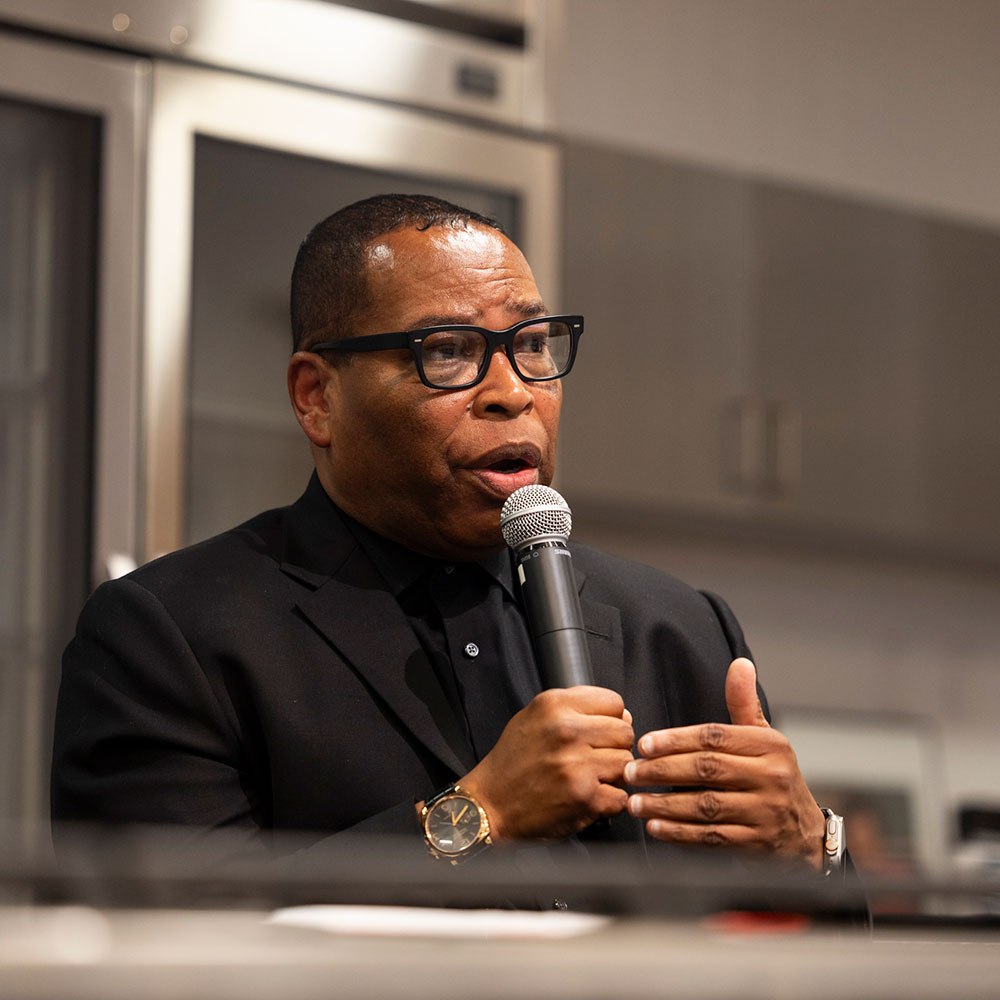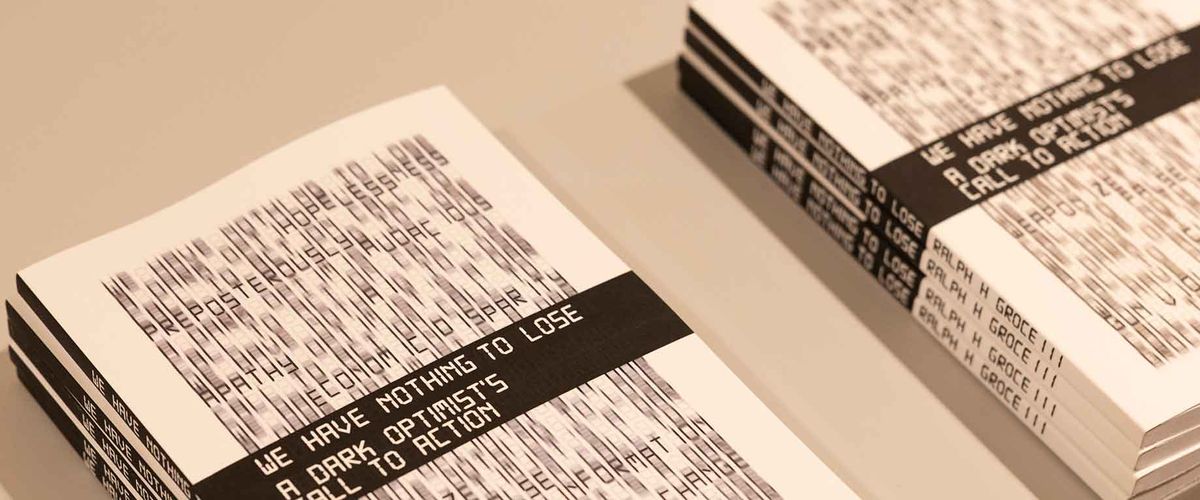On Wednesday, September 24, Boston University Metropolitan College Dean Tanya Zlateva welcomed alum Ralph H. Groce, III (CGS, Questrom, MET) to campus for an evening of discussion centered on his new memoir-meets-manifesto, We Have Nothing to Lose: A Dark Optimist’s Call to Action (Leaders Press, 2024). Joining Mr. Groce and Dean Zlateva in front of a packed audience was Groce’s mentee Ethan Okwuosa, a captain of BU’s basketball team and a graduate student at Questrom School of Business. “He’s just an amazing young man,” said Groce, who himself played on the Men’s Basketball team as an undergraduate and earned a varsity letter under coach Rick Pitino.
 We Have Nothing to Lose challenges its audience to find renewed hope and resolve amid trying times, with Groce blending vision and values to craft a narrative that embodies his dream for a brighter future through commitment to leadership and positive change. It follows the arc of his upbringing in Pittsburgh, Pennsylvania; the revelation of his college years at Boston University; his success as an entrepreneur; and, ultimately, his enduring dream of transforming the world. In fact, at age four Groce declared that he would someday ascend to the highest office in the land—a claim that earned his teacher’s admonishment that he was “delusional and disruptive.”
We Have Nothing to Lose challenges its audience to find renewed hope and resolve amid trying times, with Groce blending vision and values to craft a narrative that embodies his dream for a brighter future through commitment to leadership and positive change. It follows the arc of his upbringing in Pittsburgh, Pennsylvania; the revelation of his college years at Boston University; his success as an entrepreneur; and, ultimately, his enduring dream of transforming the world. In fact, at age four Groce declared that he would someday ascend to the highest office in the land—a claim that earned his teacher’s admonishment that he was “delusional and disruptive.”
Held in the Groce Pépin Culinary Innovation Laboratory at 808 Commonwealth Avenue, the evening began with Groce reflecting on sharing a name-space with famed chef and BU MET educator Jacques Pépin. “Jacques Pépin is a global, international treasure. And the opportunity to work with him, partner with him, on this endeavor is just a godsend,” Groce said.
Beyond his involvement with the Groce Pépin Culinary Innovation Laboratory, Groce’s relationship with his alma mater runs deep. He earned his master’s in Urban Affairs from BU’s Metropolitan College and is chair of the MET Dean’s Advisory Board as well as a member of BU’s Advisory Board. In 2017, he received the MET Distinguished Alumni Award for Service to Alma Mater and delivered remarks at MET’s Convocation Ceremony. That same year, he also endowed the College’s Ralph H. Groce, III Scholarship, awarded each semester to a deserving, full-time, undergraduate computer science student.
Groce is president and chief operating officer of Scroobious, a startup initiative focused on creating equitable access to investment capital. Prior to joining Scroobious, he had a long career at Wells Fargo, where he served as chief information officer, global head of operations technology. Dean Zlateva reflected on Groce’s time with Wells Fargo, saying, “What is very typical for Ralph is that, wherever he goes, he leaves a trace, he leaves a mark—something has changed.”
The Dean took a moment to define “dark optimist,” as the phrasing plays a key role in Groce’s book title and outlook. “Meaning ‘dark,’ yes—because he doesn’t shy away from any problems. But also ‘optimist’ because he always looks ahead, for change and for new creative solutions,” she said.
Groce still nurtures that presidential aspiration, and is hopeful that We Have Nothing to Lose provides inspiration for those who might in turn inspire others to rise to their life’s occasion. “I believe we are at an existential crisis point,” he explained. “If we don’t do something different, we have the chance to destroy ourselves. And that’s not acceptable.”
Recalling the origins of his book’s title, Groce reflected on an August 2021 visit to Martha’s Vineyard which resulted in a life-changing experience. Leaders and luminaries were gathering at Union Chapel for open discussions on the nation’s state of affairs. A reverend from Chicago, Rev. Otis Moss III, whose father was a leader during the Civil Rights Movement, led a service.
That influential sermon centered around how Rev. Moss loved the circus growing up—especially the elephants. Amazed by their scale, intelligence, and grace, the young Moss wondered aloud how the elephants could be controlled by their handlers. His godfather told him that the animals are caged at an early age and kept on short chained leashes.
“What it does is, it socializes them, teaches them, to think of themselves as much smaller than they actually are,” Groce recounted. “And by doing that, they never realize their true potential and true power. It allows them to be controlled and subjugated and managed in a way that belies their intelligence and their size. However, [Moss] said, if and when those animals, as they grow and mature, ever get to a place where they’re threatened, or they feel challenged and begin to recognize who they are, what they are, and what they’re capable of, change is coming. When that happens, a revolution is coming.”
Groce homed in on this significant point of untapped potential.
“When we begin to understand who we are, and what we’re capable of, and the extraordinary challenges we’re facing, that we have nowhere else to go, no one else to rely on, a revolution is coming,” he said. “Change is coming. And when we realize we have nothing to lose, that is when we realize that we, we, can collectively change the course of this country, and change the course of this world.”
Groce, Dean Zlateva, and Mr. Okwuosa continued to discuss a wide range of subjects, ranging from the current state of our world—wars, emerging disruptive technology, and cultural rifts—and what leaders should prioritize, to the challenges faced by universities, such as rising costs, reputational damage, and charges that the skills earned are not stackable. When asked by Okwuosa about the challenges of living with intention, Groce spoke of how exhausted a person should be at the end of every day, if they are expending their energy on their grandest intentions.
On a lighter note, Groce also shared a story about pitching BU President Melissa Gilliam on a return of the BU football program—to no avail. Nevertheless, he remains a committed Terrier.
“I’m involved with Boston University because this experience was transformational for me. It changed my life,” Groce told the audience. “And I’m here because I want to make [higher education] as accessible to people—to everyone, particularly people who look like me, under-represented groups,” he said, before adding, “But it needs to be something different tomorrow than it is today.”
View a Zoom recording of the Alumni Author Talk with Ralph H. Groce, III.
